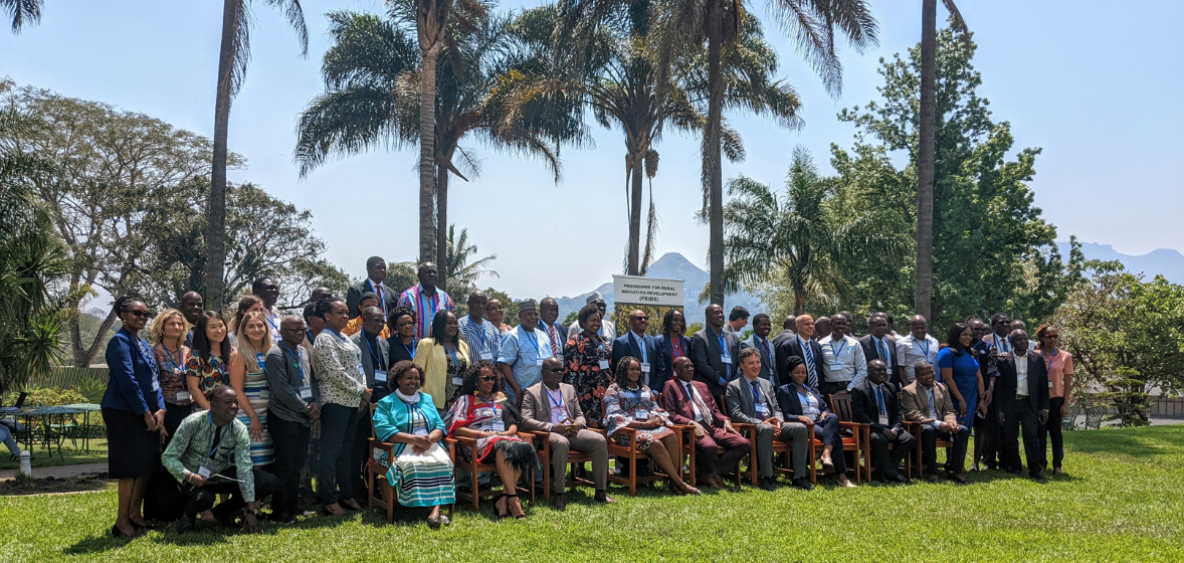 Participants gather for a group photo on the first day of the 2022 Resilient Food Systems Annual Workshop. (c: ICRAF)
Participants gather for a group photo on the first day of the 2022 Resilient Food Systems Annual Workshop. (c: ICRAF) RFS stakeholders, including the Global Environment Facility Secretariat, government officials and the African Union Commission attended the 2022 Resilient Food Systems Knowledge Exchange and Learning Workshop in Blantyre, Malawi. By sharing experiences and engaging in dialogue on food systems transformation with other countries in sub-Saharan Africa, RFS actors are paving the way for a new, integrated method of development for resilient livelihoods.
After two years of mostly virtual interactions, the Resilient Food Systems (RFS) programme held its 2022 Annual Workshop in Blantyre, Malawi in person from 20-23 September.
With the programme coming to the end of its original 5-year cycle, the opportunity to exchange knowledge and experiences through South-South learning was a key and well-received prospect for the project leads from 12 sub-Saharan African countries, government officials and technical partners from the RFS Regional Hub, who were in attendance. A representative from the African Union Commission also joined the group and was keen on building bridges between the RFS and the regional agenda in the continent.
Although the adaptive strategies and knowledge products created by RFS in the face of the COVID-19 pandemic were a proud achievement for the programme, nothing beats face-to-face interactions, and participants were all smiles from start to finish.
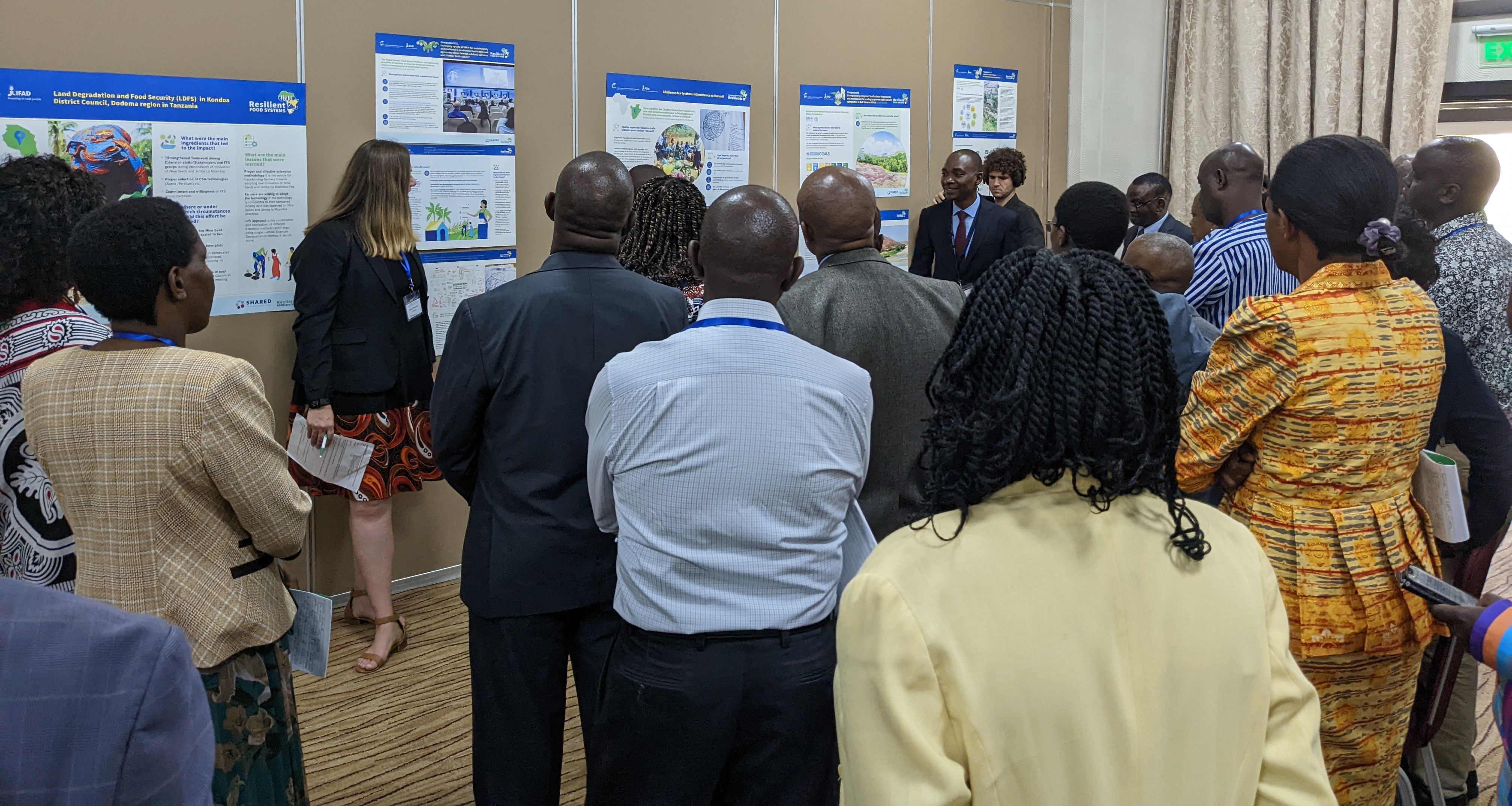
The main objectives of the event were fourfold: to
consolidate learning experiences that are jointly designed; to facilitate
practical learning and peer exchanges through field visits; to assess the value
addition of the programmatic approach piloted by RFS; and most importantly, to
celebrate the successes of the programme from inception.
Co-organized by the International Fund for Agricultural Development (IFAD) and the Center for International Forestry Research and World Agroforestry (CIFOR-ICRAF), the workshop was officially opened by the Honorable Lobin C. Lowe, MP, Minister of Agriculture for the Government of Malawi, who welcomed the congregation to the Warm Heart of Africa and expressed his support for the RFS Malawi project Enhancing the Resilience of Agro-ecological Systems Project (ERASP), led by IFAD. Having seen first-hand the improvements to food security in the beneficiary regions, Hon. Minister Lowe commended the unique approach of the programme which in the case of Malawi, is working with the existing Programme for Rural Irrigation Development (PRIDE) to ensure that communities all play a part and benefit from catchment-wide sustainable agricultural practices.
The strength of the RFS Integrated Approach Pilot is not only embedded in the integration of environmental, socio-economic and agroecological objectives toward increasing agricultural production and fighting food insecurity. RFS’s many successes come from the integration of cross-country learning that allows country-level projects to engage in regional dialogue and learn from one another.
ICRAF is responsible for knowledge management and communicating results under Component 4 of the programme. To harness the full potential of the in-person sessions, the SHARED (Stakeholder Approach to Risk Informed and Evidence-based Decision-making) platform facilitated dialogue through targeted sessions under common programmatic themes.
Learning Labs are a novel approach to experience sharing which allows space for creativity from presenters to adapt to their themes, objectives and resources. Some of the Labs took the form of a conversation between friends in a mock Blantyre café. Another was staged as a radio interview. Others still were more traditional in their approach, but the communication of challenges, lessons learned, recommendations and time for questions, comments and answers remained the same across the Labs.
The themes of the Learning Labs
Lab 1: Multi-stakeholder engagement processes (Co-led by Ethiopia and Uganda in collaboration with UNEP, FAO, ICRAF & UNDP-AGRA)
Lab 2: Bridging science-policy gaps for enhanced resilience (Led by Burkina Faso in collaboration with UNEP and African Union Commission)
Lab 3: Best practices on Sustainable Land Management for achieving Land Degradation Neutrality (Co-led by Eswatini and Niger, in collaboration with FAO and ICRAF)
Lab 4: Building resilient value chains (Co-led by Nigeria and Senegal in collaboration with UNDP-AGRA)
Lab 5: Advisory services supporting community innovations: integrated landscape management through Farmer Field Schools and Agro-Pastoral Field Schools (Co-led by Burundi, Uganda and Tanzania, in collaboration with FAO)
Lab 6: Addressing learning and adaptive management at the RFS (Co-led by Malawi and Kenya in collaboration with IFAD and ICRAF)
Over the course of the workshop, an interactive, experience-sharing wall displayed Impact Posters developed by country project teams and partner organisations under the Regional Hub. Each poster described an impact that the activities had, who they impacted, the ingredients which led to the impact, and advice for scaling the impact.
One of the most important elements of any in-person RFS Annual Workshop is to provide the opportunity for RFS stakeholders to see firsthand what host projects are doing on the ground.
Participants signed up for field tours to visit catchment management activities in Zomba and Phalombe districts, which are located just an hour or so outside of Blantyre.
Field day began with a visit to the District Commissioner’s office, where the agricultural innovation teams and the Commissioners themselves welcomed RFS and provided some background on their interventions in the catchment areas.
The District Commissioner’s team then joined the groups in visiting lead farmers and their communities on a trip from the upper to lower catchment, to give an idea of how interventions in upper catchments can benefit irrigation schemes downstream.
The ERASP and PRIDE project teams have worked diligently to bring the benefits of catchment level management to the farmers who live upstream of irrigation projects, even though they do not have direct access to the scheme itself. This has taken the form of alternative livelihood activities like a livestock pass-on program, capacity training for making Chitezezo cookstoves to fight deforestation, and erosion reduction techniques like stone bunds or reforestation supported by beekeeping.
The importance of South-South learning exchanges was truly highlighted when, during the workshop, the RFS Kenya team was invited to remain in Malawi for an extra few days so that the two projects could learn from each other’s experiences. The RFS Kenya project, the Upper-Tana Nairobi Water Fund, is Africa’s first water fund and has seen incredible results in catchment management and improving water quality downstream through improving farmers’ lives upstream.
The results of this exchange are sure to benefit each country project and help scale the fruits of their efforts within and beyond their respective project communities.
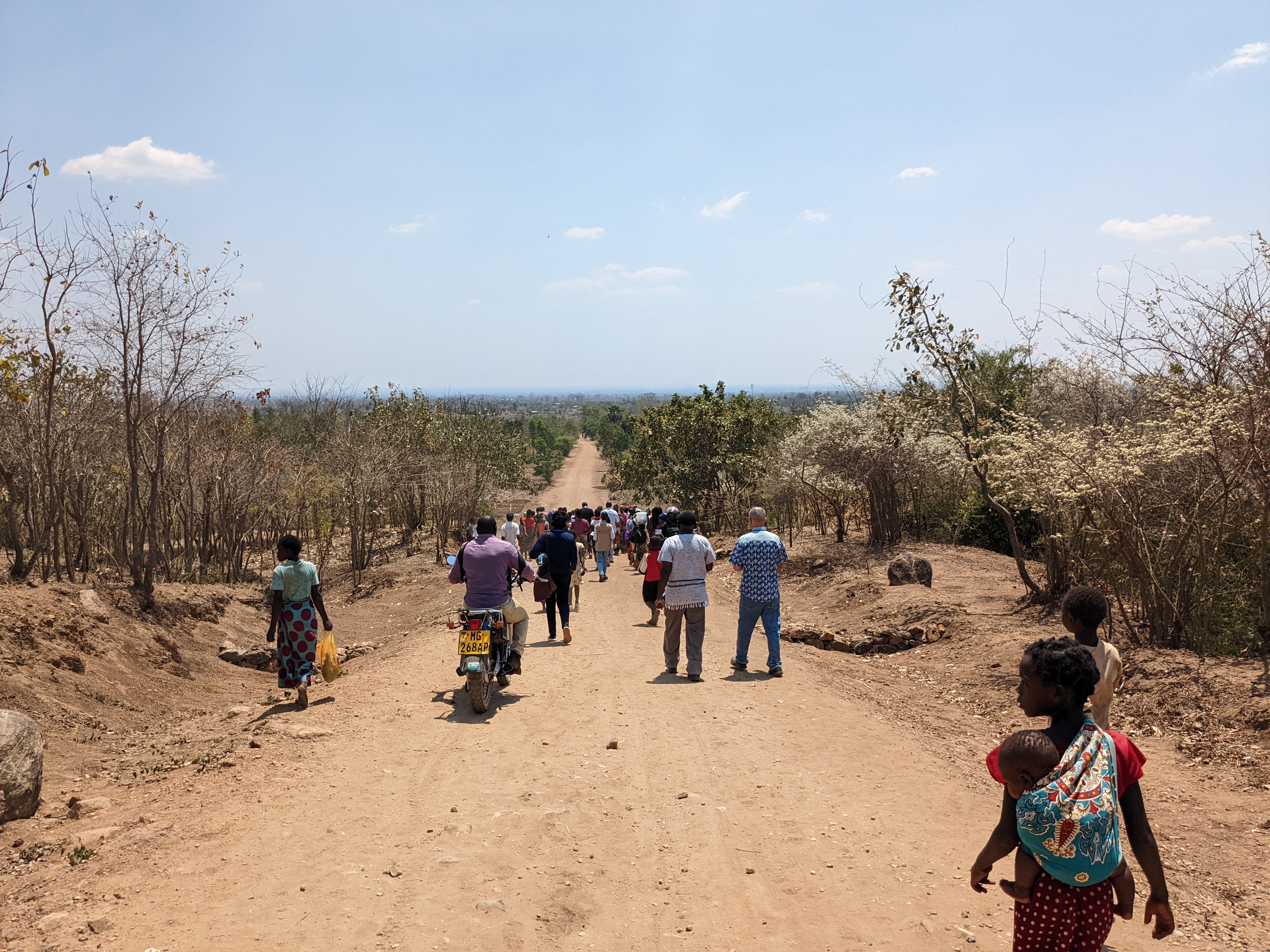
The workshop concluded with a panel session with Jean-Marc Sinnassamy (GEF Secretariat), Agnes Yobterik (Ministry of Environment and Forestry, Kenya), Maam Suwadu Sakho-Jimbira (IFAD), Iro Souley (Ministère du Plan, Sénégal), Anne-Sophie Poisot (FAO), Léopold Sekeyoba Nanema (Secrétariat Exécutif du Conseil National de Sécurité Alimentaire, Burkina Faso), Munday Makoko (PRIDE/ERASP), and Fergus Sinclair (CIFOR-ICRAF). The panellists shared what they are celebrating from years of programme implementation, and how they are planning to communicate their respective successes to influence transformative changes. This touched on scaling, momentum and sheer numbers.
“We have everything to celebrate in this programme,” said Agnes Yobterik (Kenya), who has seen 51000 households change their lives for the better, 77000 hectares of land under sustainable land management practices, and an increase of 42 million additional litres of water enter a Tana River dam. Scaling in their case means packaging their successes and collaborating on future African water funds; the Upper Tana Nairobi Water Fund (UTNWF) was the first of its kind.
The Resilient Food Systems programme has been extended until mid-2023 (with a few RFS projects going beyond then), making discussions around scaling and exchanging knowledge especially pertinent as the programme rounds up learnings from the IAP. During the Consultative Committee meeting, held in person after the workshop had concluded, key themes focused on not only scaling at the country and regional levels, but the sustainability of interventions, like the many multi-stakeholder platforms facilitated through RFS which are making a difference in the project areas.
Throughout the workshop, participants were asked to respond to guiding questions about their respective project experiences under core themes. Stay tuned for the release of the Workshop Report which will include the results of these prompted responses that will showcase the diversity of experiences across the programme and serve as a helpful tool for inspiring new approaches to food systems transformation.
The RFS programme was funded in part through the GEF-6 replenishment cycle. With GEF-7 already underway, and plans for GEF-8 being prepared, the important lessons learned throughout the RFS and especially in cross-country dialogue will be carried forward, not just in the GEF’s future strategies, but in the strategies of all partner organisations involved with this incredibly impactful programme.
In the meantime, materials from the workshop, including presentations, posters and more, will be uploaded to the RFS Knowledge Centre and the dedicated workshop event page, as they become available.
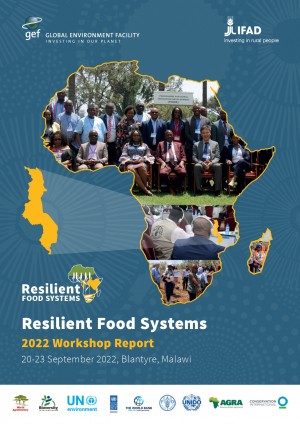
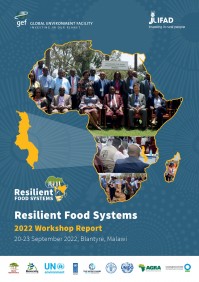
The stakeholders from the Resilient Food Systems programme met in Blantyre, Malawi in September 2022 to attend the Annual Knowledge Exchange & Learning Workshop.
The 4-day workshop consisted of jointly-designed learning labs, sessions from Hub partners, and an interactive evidence and experience wall. The RFS Malawi team also hosted the participants on a field trip to visit their project sites in Zomba and Phalombe districts.
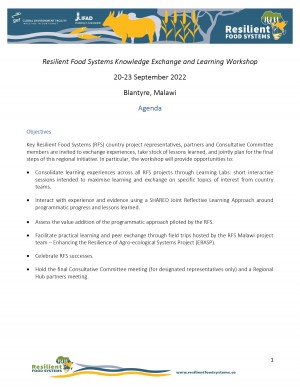
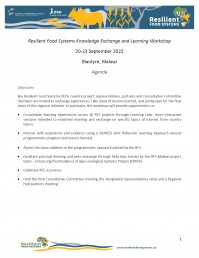
Key Resilient Food Systems (RFS) country project representatives, partners and Consultative Committee members were invited to exchange experiences, take stock of lessons learned, and jointly plan for the final steps of this regional initiative at the 2022 Resilient Food Systems Knowledge Exchange and Learning Workshop in Blantyre, Malawi. The final agenda provides the structure of the workshop and its sessions.
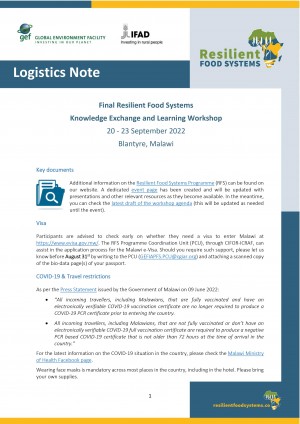
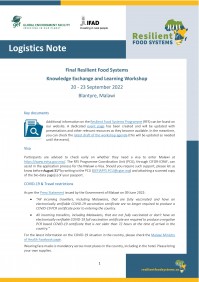
Participants of the Resilient Food Systems Knowledge Exchange and Learning Workshop can find information on lodging, transportation, visa requirements for visiting Malawi, and other useful information in this Logistics Note.
Subscribe to our monthly newsletter to receive updates on stories directly from the field across all our projects, upcoming events, new resources, and more.